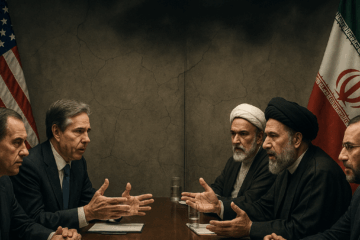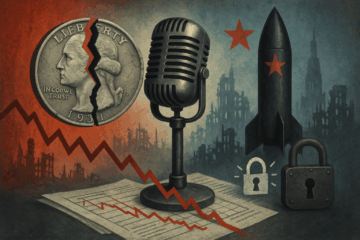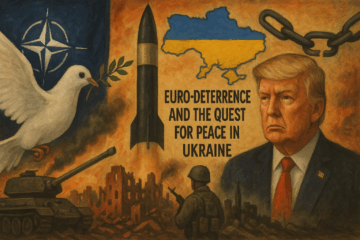The delicate architecture of international security, built upon decades of painstaking negotiations and agreements, faces unprecedented challenges. From the erosion of established agreements and treaties to the resurgence of nationalist agendas, the world grapples with a shifting landscape where the specter of unconstrained nuclear proliferation is increasingly possible. President Donald Trump’s “America First” agenda is perceived by many within the United States and among allies as American withdrawal from long-standing defense agreements. Thus, it is prompting a critical examination of the trajectory of global arms control.
Major events shaping the current arms control landscape include the unraveling of key treaties. The demise of the Intermediate-Range Nuclear Forces (INF) Treaty was triggered by Russian violations and the subsequent withdrawal by the United States—signaling a dangerous erosion of strategic stability. When coupled with the uncertain future of the New Strategic Arms Reduction Treaty (New START), which limits American and Russian operationally deployed strategic nuclear weapons, there are concerns about a return to unconstrained nuclear competition.
The last time such foundational treaties were absent the world was illuminated by the glow of vacuum tubes and dial telephones, not the intricate web of digital connectivity that now exists. The Joint Comprehensive Plan of Action (JCPOA), the Iran nuclear deal, also suffered a significant blow when the first Trump administration lost faith in its validity—fueling anxieties about Iran’s nuclear ambitions and the potential for regional proliferation.
Trends in arms control are marked by a resurgence of great power competition and a decline in multilateralism. The rise of China as a military power, coupled with its rapid nuclear modernization, challenges the existing arms control framework, which largely focused on Russo-American relations. It is noteworthy that the US sided with Russia against a Western-led effort to further punish Russia at the United Nations for Russia’s aggression against Ukraine. This was perhaps a move to spur Russian agreement to a truce in the conflict but is unusual.
The proliferation of advanced technologies, such as hypersonic weapons and artificial intelligence, further complicates arms control efforts, as these technologies have the power to threaten national sovereignty. The increasing use of cyber warfare and space-based weapons also creates new domains of conflict that are difficult to regulate.
Themes that dominate contemporary arms control discourse include the erosion of trust and the rise of strategic ambiguity. The breakdown of established treaties and the lack of transparency in military modernization programs are fueling distrust among nations. This apparent shift in doctrine may represent a genuine erosion of trust, or a calculated and abrupt pivot designed to reset a paradigm that is overly reliant on American leadership. The strategic ambiguity surrounding emerging technologies and the intentions of potential adversaries creates a climate of uncertainty. The rise of nationalist agendas and the decline of multilateral institutions can undermine efforts to build consensus on arms control and nonproliferation.
President Trump’s America First agenda and its associated call for allies to bare a larger burden of their own security impacts the arms control landscape. The withdrawal from the INF Treaty and the JCPOA was, for some, a rejection of multilateral agreements and a preference for unilateral action.
This approach stood to alienate allies and emboldened adversaries, undermining efforts to build international consensus on arms control. The Trump administration’s skepticism towards international institutions and its emphasis on American strength over international collaboration, which the administration sees as often at the expense of the United States, may contribute to the erosion of the remaining arms control framework. The reduction of funding for arms control initiatives and the appointment of officials with limited experience in this field signals a diminished commitment to nonproliferation.
The current arms control and nonproliferation landscape is marked by unprecedented challenges. The unraveling of key treaties, the resurgence of great power competition, and the rise of nationalist agendas create a volatile environment that may take unexpected turns. President Trump’s America First agenda and its efforts to require greater cost sharing leave adversaries wondering if the United States intends to leave existing alliances. Addressing the challenges posed by the changes requires a renewed commitment to multilateralism, transparency, and dialogue. Only through concerted international efforts can the world hope to mitigate the risks posed by unconstrained proliferation and ensure a more stable and secure future.
Brandon Toliver, PhD, serves on the A4 staff of Headquarters Air Force. The views expressed are those of the author and do not reflect the official guidance or position of the United States government, the Department of Defense, the United States Air Force, or the United States Space Force.





Another title could be “Global Security Isn’t Optional”. I like how you allude to the instability that crosses borders through conflict spillover, arms trafficking, and weakened trust in international systems. Everyone is impacted, from small states vulnerable to proxy conflicts to major powers forced to increase defense spending. I hope this sparks a renewed focus on multilateralism beyond idealism. President Trump does correctly point out the over reliance on the U.S. in all matters global for many decades. Some may not like the delivery, but the facts are clear.
Absolutely agree—“Global Security Isn’t Optional” is a powerful framing. You nailed it: instability anywhere has ripple effects everywhere. It’s time we move the multilateralism conversation from lofty ideals to practical necessity. And you’re right—regardless of political tone, the burden imbalance is real and long overdue for recalibration.
Rather than being passive observers of great power rivalry, African states can assert moral and diplomatic leadership to restore trust and uphold the principle that security must be equitable, not dictated solely by a few global actors. What are your thoughts?
Absolutely agree. African states are not spectators in global affairs—they are key stakeholders whose voices and values matter in shaping the future of international security.
Spot on. African states have both the moral authority and the lived experience to challenge the status quo and redefine what equitable security looks like. By championing diplomacy, leading on arms control dialogue, and pushing for reforms in global governance, Africa can shape a more balanced and just international order—not just react to it.
From an African perspective, it’s vital to recognize that arms control isn’t only about superpowers—its ripple effects reach across every continent. Africa’s voice in arms control dialogue is often underrepresented, yet the continent bears many of the consequences.
Well said. Africa may not be a major arms producer, but it often bears the brunt of global arms flows and policy gaps. Elevating African voices in arms control is essential—not just for equity, but for crafting solutions that reflect the realities on the ground.
Brandon, this was a strong and timely piece. You broke down the collapse of key treaties and the ripple effects of rising nationalism and new tech with real clarity. It’s clear you’ve thought deeply about where this is all headed. Proud to see your voice in the middle of these critical conversations.
Thank you. Adam Lowther was a big help in the finished product. You got the main point. All these things are interconnected and we should all be paying attention!
This is an amazing article. I feel Dr.Toliver Has been straightforward, understanding concerning, architecture of international security, Your views and data provided, was clear, providing wisdom and knowledge to everyone who read this article.
Thank you for the kind words. I have to acknowledge Dr. Adam Lowther as a major part of the finished product you read. Stay tuned. We have more coming!
What a fragile state of global arms control is in! Emerging technologies and great power competition further complicate the landscape, making dialogue and multilateralism more crucial than ever.
2. **Name:** Daniel Kim
**Email:** daniel.kim@example.com
**Comment:** “The erosion of key treaties and the rise of nationalist policies present a worrying trend for global security. This piece captures the urgency of addressing these challenges through transparency and collective effort.”
3. **Name:** Sophia Martinez
**Email:** sophia.martinez@example.com
**Comment:** “The themes of distrust and strategic ambiguity discussed here resonate deeply with the current geopolitical climate. Strengthening arms control frameworks and fostering trust among nations is essential for preventing a return to unchecked proliferation.”
Let me know if you’d like further tweaks or different names again!
This is very insightful. If not the US, who will/ should lead global communities in their “renewed commitment to multilateralism?”
That is the million dollar question. The U.S. has business to address on the home front.
Could you elaborate on the potential for new, innovative arms control mechanisms that move beyond traditional treaties and address the challenges posed by modern technologies and non-state actors?
I can try! Traditional arms control treaties often struggle to keep pace with rapidly evolving technologies and the rise of non-state actors. Innovative mechanisms could include dynamic, modular agreements that update more frequently, AI-assisted verification systems for real-time monitoring, and multistakeholder frameworks that engage tech companies and civil society alongside states.
I appreciate your emphasis on the erosion of trust in international relations. This is front and center in the news. In your opinion, what specific steps can be taken to rebuild trust and foster greater transparency among nations with conflicting interests?
Thank you—I completely agree that trust is foundational and increasingly fragile. Rebuilding it requires sustained commitment to transparency and dialogue. Specific steps could include expanding confidence-building measures, establishing verifiable arms control or cyber agreements, increasing data sharing through multilateral forums, and reviving diplomatic channels even amid tensions.
I am curious about your perspective on the role of cybersecurity norms in preventing escalation in a world where cyber warfare is becoming increasingly prevalent.
That’s a complex one. Cybersecurity norms play a critical role in preventing escalation. In theory they establish shared expectations for responsible state behavior in cyberspace. Clear norms—such as refraining from targeting critical infrastructure during peacetime—create a baseline for accountability, reduce ambiguity, and help prevent misattribution from spiraling into broader conflict. A major issue is that without widespread enforcement mechanisms or mutual trust, norms alone aren’t enough.
This analysis clearly articulates the challenges facing arms control today. The focus on great power competition and the decline of multilateralism is eye opening. How do you suggest smaller nations navigate this complex landscape, especially those feeling increasingly vulnerable due to the actions of larger states?
Strengthen regional alliances, diversify strategic partnerships, and invest in resilience—diplomatic, economic, and technological—to reduce dependence and increase leverage. That would be my primary advice.